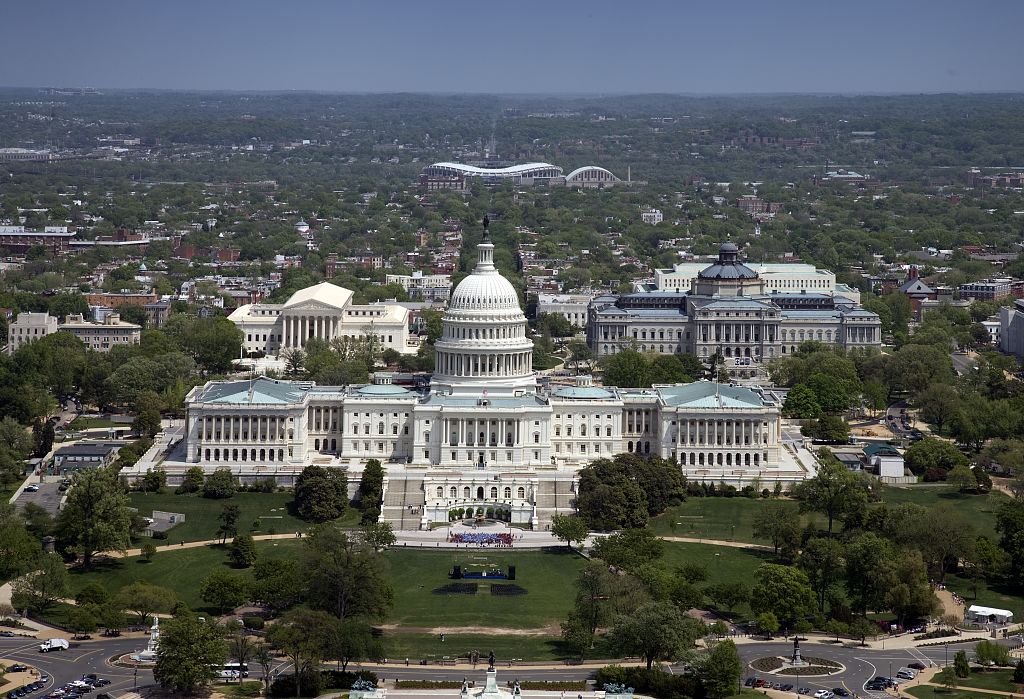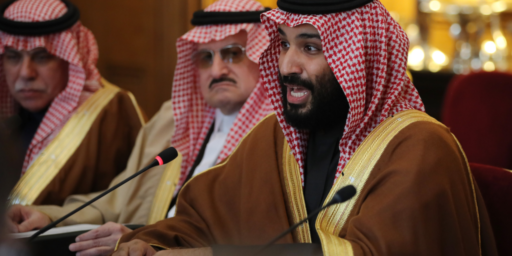House Vote Votes To End U.S. Assistance For Saudi War On Yemen
In a rare display of assertiveness in the foreign policy arena, the House voted yesterday to bar U.S. assistance in Saudi Arabia's genocidal war on Yemen.

In a somewhat surprising move, the House of Representative voted on Wednesday to block further American support for the Saudi war on Yemen:
WASHINGTON — The House voted on Wednesday to end American military assistance for Saudi Arabia’s war in Yemen, a defiant and rare move to curtail presidential war powers that underscored anger with President Trump’s unflagging support for Saudi Arabia even after the killing of a Washington Post columnist, Jamal Khashoggi.
The 248-to-177 vote, condemning a nearly four-year conflict in Yementhat has killed thousands of civilians and inflicted a devastating famine, will pressure the Republican-controlled Senate to respond. Eighteen Republicans — almost all of them hard-line conservatives with the Freedom Caucus — voted with the Democratic majority.
Congress’s upper chamber in December passed a parallel resolution, 56 to 41, in a striking rebuke to the president and his administration’s defense of the kingdom. But that measure died with the last Congress after the House Republican leadership blocked a vote.
Dozens of Democrats, however, softened the blow when they defected to a Republican amendment to allow intelligence sharing with Saudi Arabia to continue when “appropriate in the national security interest of the United States.”
Senate passage of the Yemen resolution could prompt Mr. Trump to issue the first veto of his presidency, and it would come after Republicans have registered their unhappiness over other foreign policy issues, such as the president’s plan to withdraw troops from Syria and Afghanistan and his threats to pull the United States from the North Atlantic Treaty Organization. On Wednesday, a bipartisan group of senators introduced new sanctions on Moscow that would require the secretary of state to submit a determination of “whether the Russian Federation meets the criteria for designation as a state sponsor of terrorism.”
Democrats demanded Senate action.
“This is their opportunity to send a message to the Saudis that their behavior on Khashoggi and their flagrant disregard of human rights is not consistent with the American way of doing business and not in line with American values,” Representative Ro Khanna, Democrat of California, the bill’s lead sponsor, said in an interview, adding that he was “relieved” that Congress finally took action on the resolution, which he first introduced in 2017.
The House resolution is a rare use of the 1973 War Powers Act, which gave Congress the ability to compel the removal of military forces absent a formal declaration of war. Those powers, created in the wake of the Vietnam War, have almost never been used, as lawmakers have demurred from intervening in politically sensitive matters of war, peace and support for the troops.
But the conflict in Yemen is proving to be different. Senators sponsoring their own resolution are expected to act quickly to force a vote, as lawmakers in both parties fume over how the administration has responded to Saudi Arabia’s role in the killing of Mr. Khashoggi, who was based in Virginia. Senator Christopher S. Murphy, Democrat of Connecticut and one of the sponsors, said he anticipated a vote “within the next 30 days.”
The White House pre-emptively threatened to block the resolution over the weekend, with administration officials arguing in a statement of administration policy that “the premise of the joint resolution is flawed” because the United States has provided only “limited support to member countries of the Saudi-led coalition” in Yemen.
Senate aides involved in the resolution say they are optimistic that it will pass, though it is unclear whether it will garner the same level of support among Republicans that it did in December. Some Republicans, mindful of an embarrassing veto showdown with Mr. Trump, are looking for other ways to show their dissatisfaction.
Members of Congress expressed fresh outrage last weekend after the White House declined on Friday to meet a legally mandated deadline to report whether the administration believed Saudi Arabia’s crown prince, Mohammed bin Salman, was personally responsible for Mr. Khashoggi’s death, as the C.I.A. has concluded.
In a letter sent to Senator Robert Menendez of New Jersey, the ranking Democrat on the Committee on Foreign Relations, Secretary of State Mike Pompeo praised the administration’s “dedication to promoting accountability” in placing sanctions on 17 Saudis for their involvement in Mr. Khashoggi’s killing, and pledged to continue to “impose tangible and significant consequences.” The day before, The New York Times reported that the crown prince told an aide in 2017 he would use “a bullet” on Mr. Khashoggi if he did not end his criticism of the government.
The response drew widespread condemnation from members of Mr. Trump’s own party.
“Everyone involved in this gruesome crime must be identified and held accountable,” said Representative Michael McCaul of Texas, the ranking Republican on the Committee on Foreign Affairs. “When the United States fails to lead, we compromise our integrity and abandon those pursuing justice around the world.”
Senator Marco Rubio, Republican of Florida, told reporters on Tuesday that “the sooner the White House gets there the better,” adding: “I don’t know what’s taking so long. I think it’s pretty obvious the crown prince had to be involved in this.”
Even if the President does veto this measure and Congress is unable to override the veto, the very fact that a measure such as this passed both chambers of Congress is an encouraging sign for those of us who have long lamented the fact that the Legislative Branch has proven to be far too lax in providing a check and balance on Executive Branch actions in the area of foreign policy. As I have noted several times in the past, the history of the United States, especially since the end of World War Two, has seen Congress gradually cede more and more authority in this area to Presidents who have proven to be more than willing to take that authority and run with it, thus expanding the power and scope of Presidential authority far beyond where Article II of the Constitution intended it to lie. Even on occasions where Congress has sought to rein in that power, such as with the passage over President Nixon’s veto of the War Powers Act in 1973, the move has proven to be entirely ineffective largely because no President has considered themselves bound by that law and the Courts have proven unwilling to step in and intervene in cases where the President clearly seems to be acting in violation of the law. Finally, Congress has generally until now been unwilling to exercise its authority as appropriator of funds to limit Presidential authority in cases of overseas military deployments, typically because most Congressman and Senators are loathe to be seen as taking money away from the troops that have been committed by the President even in situations where that deployment is clearly outside Presidential authority. Hopefully, this moves marks the beginning of a new trend in which there will be more oversight of Presidential action when it comes to foreign and military policy.
As he did with the resolution that passed the Senate in December, Daniel Larison praises this action by the House:
While opponents of the measure desperately tried to deny that the U.S. was involved in hostilities in Yemen, the evidence of extensive U.S. involvement over the last four years made that an untenable claim. Despite years of lies from this administration and the Pentagon, most House members could recognize an unauthorized U.S. war when they saw one. Despite the constant fear-mongering of pro-Saudi hawks in both houses, most House members understood that the war serves no American interests and implicates us in war crimes and crimes against humanity. When the only argument that the war’s supporters had was to keep shouting “Iran!” at the other side, it was just a matter of time before they lost.
It is unfortunate that it has taken almost four years for Congress to act on U.S. involvement in the war, but it has not been for lack of effort on the part of the war’s opponents. In just the last two years, we have seen the war on Yemen go from being almost completely invisible and ignored to becoming the focus of the most important antiwar vote in modern U.S. history. The successful passage of H.J.Res. 37 has once again forced the issue to center stage, and it sets up an overdue fight with the executive over war powers and over our relationship with the Saudis and the rest of the coalition.
The question going forward is whether Congress would be willing to go further than this on either the Yemen War or Khashoggi issues. With respect to the first, the fact that Congress controls the powers of the purse means that it could, if it wanted to, insert language into the budget resolution barring the President and the Defense Department from providing any aid of any kind to Saudi Arabia’s war on Yemen. While this would be an atypically assertive role for Congress to take, it would be something totally within the powers of Congress to do. Congress could also seek to further sanction the Saudis by cutting off all foreign aid, military and otherwise, to the Kingdom regardless of whether or not it is related to the War On Yemen. Finally, Congress could impose sanctions under the Magnitsky Act against the Kingdom of Saudi Arabia generally and the Crown Prince and those close to him specifically and President Trump would be obligated to impose them notwithstanding the fact that he and his Administration continue to kiss up to a regime whose de facto leader is a murderous thug. With regard to this option, though, it’s worth noting that the White House recently failed to meet the deadline under the Magnitsky Act to respond to a Congressional demand that the Administration submit a report on Saudi complicity in the murder of journalist Jamal Khashoggi despite the fact that the deadline to respond recently expired. This could be the impetus for Congress to act further, and they should do so without any further delay.
In addition to this, as Larison goes on to note, there is much more that needs to be done with respect to the genocide going on in Yemen at the hands of our Saudi allies. Even if the war ended immediately, which seems unlikely, the consequnces of that war are going to be felt for decades to come. Most immediately, the people of Yemen are facing famine, cholera, the consequences of the displacement of millions of people, and poverty and those problems are not going to end with the end of the war. These problems will only get worse if the war continues, and Yemen will likely become a breeding ground for radicalism in the same way that Afghanistan, Syria, and Libya have over the years. The vote yesterday was, as Larison notes, a step in the right directon but it was only a step and it’s unclear if it will amount to anything substantial. f.





Trump won’t stop the KSA from murdering children in Yemen because Trump is on MBS’s payroll. The Saudis are single-handedly keeping his DC hotel afloat and rescuing Jared. Trump’s business is disintegrating and he knows when he’s done playing president he’ll need lots and lots and lots of cash. Who has lots and lots and lots of cash? That’s right: the KSA.
Greed, ego, spite: the holy trinity of Trump motivations. He never does anything that isn’t about greed, ego or spite. This is a three-fer for Trump: the Saudis give him money, they tell him he’s swell, and it pisses off decent people, so there is no chance that Trump will change course, he’d go on supporting MBS if MBS set up gas chambers in Yemen.
War deaths — even unnecessary civilian casualties — are not the same thing as “genocide.” There is no “genocide” in Yemen. Yemen has over 25 million people. The war has killed fewer than 100,000 of them — less than one percent of its population. That’s not genocide. It is less than 2 percent as many people as died in the Congo in its civil war (about six million died in the Congo). Malnutrition rates are still lower in Yemen than in the Central African Republic.
The Saudis deserve criticism, but they are not committing genocide against their fellow Arabs.